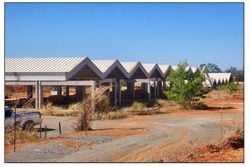The Caribbean Court of Justice (CCJ) has granted government’s request to be added as a party in the appeal filed by the Environmental Protection Agency (EPA) which is challenging a High Court order that it enforce the liability clause in permits for ExxonMobil’s offshore oil operations here.
The government through Attorney General Anil Nandlall SC had first made its application to the Guyana Court of Appeal, where it was denied.
As a result, Nandlall subsequently approached the apex court—the CCJ—seeking special leave to appeal, with the hope of government being allowed to join the litigation.
In an order made on Monday, the Trinidad-based court of last resort announced that after considering the submissions of counsel for all the parties, it had granted the Guyana government’s request to join the matter.
According to the order, the Court said that its brief reasoning for the decision allowing the appeal, will be subsequently known.
No orders were made as to cost.
Background
In a landmark ruling back in May of last year, High Court judge Sandil Kissoon declared the EPA to be in breach of its statutory duty in failing to enforce compliance by Esso Exploration and Production Guyana Limited (Esso/EEPGL) of its financial assurance obligations, and keep indemnified the agency and the Government of Guyana against all environmental obligations of the permit holder and co-venturers within the Stabroek Block.
This initial challenge to have EPA enforce the liability clause in the permits it had issued to ExxonMobil had been brought by President of the Transparency Institute of Guyana Inc (TIGI) Frederick Collins, together with another concerned citizen Godfrey Whyte.
The EPA has since appealed the High Court ruling which is still pending before the Guyana Court of Appeal.
Collins and Whyte have argued that the appeal has no merit, stating that their resort to the court was their bid to ensure that the company take full financial responsibility for possible resulting harm, loss and/or damage to the environment.
Following EPA’s appeal to the local appellate court, Nandlall made an application for government to be added as a party to the proceedings.
Senior Counsel Seenath Jairam who represents Collins and Whyte had said that there is no provision in the Judicial Review Act, which allows for the Attorney General (AG) to intervene in such proceedings, since the AG—as chief representative of the Government—has to be the enforcer of judicial review breaches committed by public bodies.
Jairam’s position has been that the AG ought not to be allowed to join the proceedings, as he has no real interest in the matter; and that it is only the state agency EPA which should be made to answer.
To the argument Nandlall had made that the case is one of public interest, and warrants him intervening, Jairam had said that while that is true—because the petroleum extraction is aimed at the development of Guyana as whole—this must be done in a lawful manner.
He had said that it is to this extent that the AG should be interested publicly in ensuring that the necessary parent guarantee is provided to indemnify the government and the EPA from any possible environmental catastrophe.
It has been Nandlall’s position that notwithstanding he was not a party to the initial proceedings in the court below, or did not seek to join at that time, those are not factors that ought to be considered by the appellate court in its determination of whether he is allowed to join or not.
Arguing that he has sufficient interest in the matter, Nandlall had said that that is what the Court needed to consider, in accordance with the Judicial Review Act.
Justice Kissoon had made it clear that if the unlimited liability to fully indemnify Guyana was not put up by the deadline set, then the Esso’s permits would be suspended.
It is this that then formed the basis of an appeal filed by Esso, which came on the heels of one filed by the EPA which argued among other things that Justice Kissoon’s finding that the financial assurances set out in the permit were “unlimited; “was a flawed line of reasoning.
Esso had agreed in the permit to provide insurance and an unlimited parent company indemnity to cover all environmental loss and damage that might result from a well blowout, oil spill or other failures in the Liza 1 Development Project in Guyana’s Stabroek Block.
Justice Kissoon in delivering his judgment had said that in the course of the proceedings, the Court found on the evidence that Esso was engaged in a “disingenuous attempt which was calculated to deceive, when it sought to dilute its liabilities,” while simultaneously optimising production.
Back in February of this year, Justice of Appeal Rishi Persaud declared that he did not have jurisdiction to order ExxonMobil to provide proof that it has indeed lodged a US$2 billion guarantee which is intended to indemnify Guyana against an oil spill and associated perils.
As it said that it has lodged the sum with the Registrar of the Supreme Court, Collins and Whyte had asked the court for ExxonMobil to provide proof.
Following hearing of this application, however, Justice Persaud dismissed the summons, ruling that he did not have jurisdiction to make such an order.




